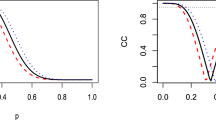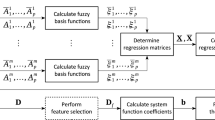Abstract.
Statistical hypothesis testing is very important for finding decisions in practical problems. Usually, the underlying data are assumed to be precise numbers, but it is much more realistic in general to consider fuzzy values which are non-precise numbers. In this case the test statistic will also yield a non-precise number. This article presents an approach for statistical testing at the basis of fuzzy values by introducing the fuzzy p-value. It turns out that clear decisions can be made outside a certain interval which is determined by the characterizing function of the fuzzy p-values.
Similar content being viewed by others
Author information
Authors and Affiliations
Corresponding author
Rights and permissions
About this article
Cite this article
Filzmoser, P., Viertl, R. Testing hypotheses with fuzzy data: The fuzzy p-value. Metrika 59, 21–29 (2004). https://doi.org/10.1007/s001840300269
Issue Date:
DOI: https://doi.org/10.1007/s001840300269




